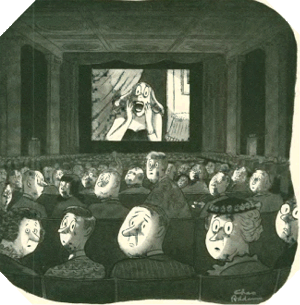"What is, if not easy, almost always possible to do is for members of the private detective school of literary criticism to prove that the writer of fiction written in the first person could not possibly have done everything that the narrator did or, perhaps, not even any of it.
 |
| "This is not easy to do" |
When you first start writing stories in the first person, if the stories are made so real that people believe them, the people reading them nearly always think the stories really happened to you. That is natural because while you were making them up you had to make them happen to the person who was telling them. If you do this successfully enough, you make the person who is reading them believe that the things happened to him too. If you can do this you are beginning to get what you are trying for, which is make something that will become a part of the reader’s experience and a part of his memory. There must be things that he did not notice when he read the story or the novel which, without his knowing it, enter into his memory and his experience so that they are a part of his life. This is not easy to do."
... Ernest Hemingway (1899-1961), "A Moveable Feast (the restored edition)"

 Edmund Wilson (1895-1972),
Edmund Wilson (1895-1972), 

 Edmund Wilson (1895-1972),
Edmund Wilson (1895-1972), 